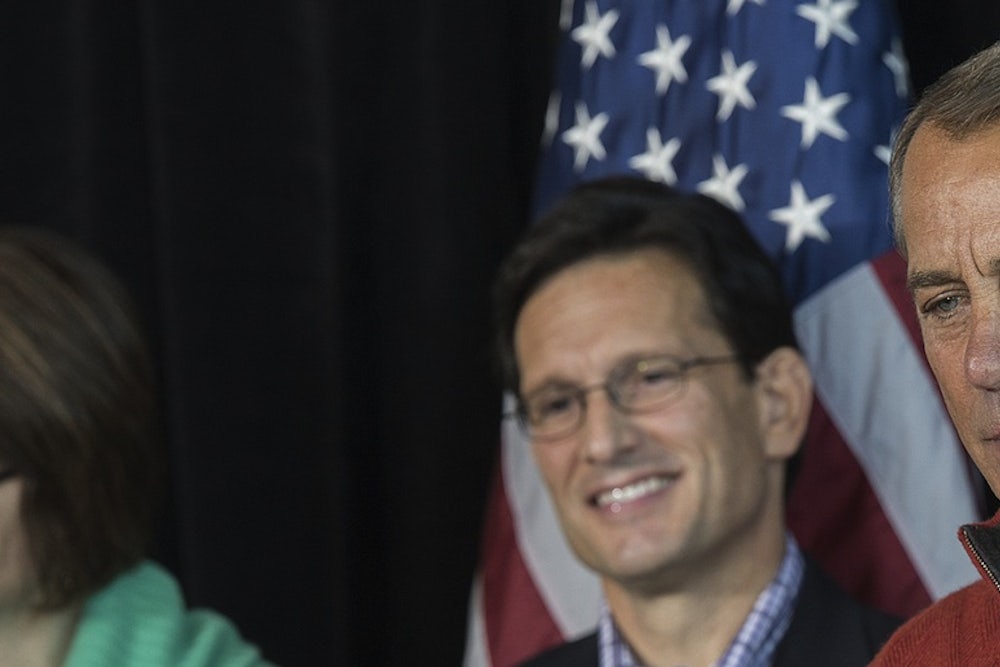The Congressional Budget Office just taught the Republican Party a lesson. Governing is hard.
The CBO on Tuesday issued a formal cost estimate of House Resolution 2575, a bill from Republican Todd Young of Indiana. The bill’s formal title is the “Save American Workers Act.” Its goal is to change Obamacare’s employer mandate—the requirement that medium-sized and large businesses pay a penalty if they do not offer affordable health insurance to all full-time employees. The definition of “full-time” is anybody who works at least 30 hours a week. And, for some time, the media has been full of stories of employers—particularly low-wage employers, governments, and universities—reducing or limiting worker hours, in order to avoid the costs of coverage.
Republicans have seized on those reports as proof that Obamacare was hurting average Americans, by limiting their hours and, as a result, their ability to earn money. “The new class of employees dubbed the ‘Obamacare 29ers’ continues to grow,” Young warned earlier this month. His bill would rectify this problem, he said, by pushing the threshold up to 40.
CBO takes a different view. Virtually every respectable economist who has looked at the numbers has determined that there’s been no large-scale shift in hours. It’s not that the anecdotes are fake. As Jed Graham of Investor's Business Daily has shown, some businesses are clearly limiting the hours of employees. It’s that, ultimately, they don’t add up to that much. The CBO reached the same conclusion—suggesting, in effect, that Young’s bill is solving a problem that may not need solving.
But that doesn’t mean Young’s bill would have no effect. On the contrary, CBO found, about one million fewer people would end up with employer health insurance. And while some of them would find other forms of coverage, like Medicaid and insurance from the new exchanges, overall the net bill’s net effect would be to increase the number of people without any insurance by about half a million.
Truth be told, adding or subtracting half a million people from the ranks of the uninsured isn’t that big a deal, at least in the context of a projection with such large uncertainty. But the employer mandate’s main purpose is to raise money. The idea is that employers who don’t supply their workers with coverage should pay a fee that helps offset the cost of those workers getting insurance elsewhere. And it turns out that moving the full-time threshold from 30 to 40 hours has a substantial effect on revenue, according to CBO: Over the next ten year period, from 2015 to 2024, the federal government would take in $73 billion less. That’s real money.
Note the irony: The employer mandate isn’t particularly popular with experts, even those who support Obamacare. Most would happily eliminate it altogether or, at least, replace it with some other mechanism. But they'd insist on replacing the revenue, because it serves a vital purpose: That money helps finance the expansions of Medicaid and new federal tax credits that will allow millions of Americans either to get insurance or, at the very least, get coverage at much lower costs. Eliminating that money altogether, as Republicans typically propose, means either fewer people get help or deficits go up.
And that’s the reality Obamacare’s critics are never willing to confront. They’re great at attacking Obamacare. But they’re lousy at coming up with alternatives that look better by comparison. There’s a reason for that. The downsides of Obamacare are real, but, in many cases, they make possible the upsides. Take away the former and the latter go away, too.
Update: I tweaked the wording to make clear why the change in uninsured might be less significant than it seems.
